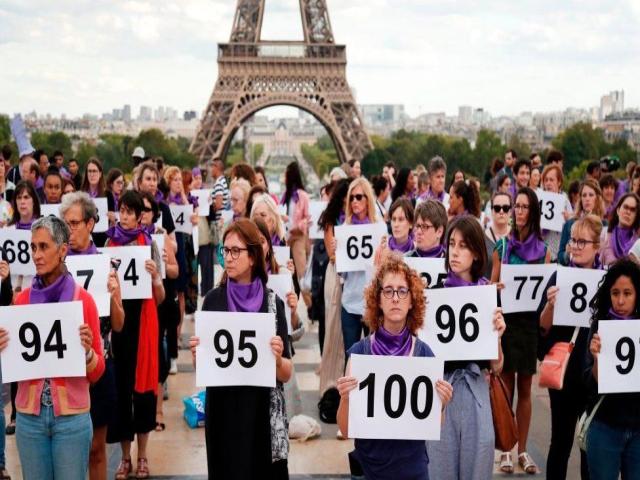Review | Femicide: The murders giving Europe a wake-up call

It was the disfigured body of a woman, the victim of a brutal attack. Her partner denies her murder.
Salomé, 21, could be France's 100th victim this year of "femicide" - usually defined as the murder of a woman by a partner, ex-partner or family member. The day after Salomé's body was found, a 92-year-old woman was caned to death by her 94-year-old husband.
Within hours, the French government announced a raft of measures to protect women from domestic violence. Other European countries have already reacted to a crime that knows no borders or social class, but the picture across the continent is mixed.
President Emmanuel Macron launched the French campaign at a national domestic violence hotline centre, but received a reality check when he listened in on a call.
A woman, who had endured decades of abuse from her violent husband, had finally built up the courage to leave him. She had asked a police officer to accompany her home so she could collect some belongings, but the officer refused, insisting he needed a judicial order to intervene.
He was wrong, but the helpline had no legal authority and the operator could only direct the victim to a support group.
President Macron shook his head in frustration. "Does that happen often?" he asked the operator. "Oh yes," she responded, "More and more."
Homicides by intimate partners are overwhelmingly committed by men against women. According to the most recent figures of such murders, the French rate is far from the highest in the EU.
But as Viviana Waisman from Women's Link Worldwide explains, violence against women cannot be simplified by numbers.
"Violence against women is an issue that transcends borders, class and socio-economic status. It impacts women and girls in all societies," she says. "There may be more or less stigma about talking about it in certain societies but it is present in all societies."
Where is murder by a partner worst?
Statistics may not tell the full story, but Romania and Northern Ireland clearly have a problem.
According to Sonya McMullan from Woman's Aid Northern Ireland, "domestic violence is not going away and many women lose their lives every year".
Incidents of domestic violence are rising and protections for women are weaker than the rest of the UK.
In March, Giselle Marimon-Herrera and her daughter Allison were found strangled in their flat in County Down. They were believed to have been killed by Giselle's partner, who was also found dead at the scene.
Connie Leonard was allegedly killed by an ex-partner in 2017 in front of her son with Down's-syndrome. The son also suffered stab wounds.
Unlike the rest of the UK and Ireland, Northern Ireland does not have a law criminalising the use of "coercive control" on a partner.
Funding for women's protection has decreased by 5% and proposals to improve women's safety have been stalled by the lack of a functioning government over the last two years.
France announces anti-femicide measures
The women killed on one day around the world
Spain's female bodyguards who protect abused women
'Society still blames the woman'
Finland, held up as a beacon of gender equality, also has one of the EU's highest murder rates at the hands of an intimate partner.
"In Nordic countries, women's equal rights are protected in the public sphere but not in the private sphere," Paivi Naskali, a professor of Gender Studies at the University of Lapland, told Open Democracy in 2013.
"The welfare state has given many rights to women, but this policy has concentrated on the labour market... not equality in private life," she said.
The Baltic republics also have a high rate of femicide. Modesta Kairyte, a social activist for domestic violence who volunteers in victim support centres in Lithuania, said the "Soviet era has left some kind of trauma," but mostly the problem is down to attitudes in society.
"Society still blames the woman," she told the BBC. "It's a shaming process."
A woman was admonished if she did not leave an abusive relationship, but equally seen as a failure if she did. There was also a widely held belief that it was better for children if the woman stayed.
"Lithuanian society thinks that it's better for the kids to stay," explained Ms Kairyte. "But all the research shows that they are more susceptible to health issues if they are in an abusive household."
Spain's deadly milestone of femicide
Spain is often held up as an example to the rest of Europe for measures aimed at protecting women against gender-based violence.
In 2004, it passed a law establishing a network of courts specialising in domestic violence and targeted extra money at programmes supporting survivors.
But in June Spain recorded the 1,000th murder of a woman by a partner since records began in 2003.
Beatriz Arroyo was 29 and decided in June to break up with her boyfriend and start a new life. When she went to their fifth-floor apartment near the eastern city of Valencia to tell him she was leaving him, he suffocated her. The next morning, he threw himself from the balcony and died.
Identified as Spain's 1,000th victim of femicide, her death on 10 June was marked as a dark day in Spain's history of "machista" violence.
Of the 1,000 victims, 607 had been killed by their partner, 225 by an ex-partner and a further 168 had been in the process of separating from their partner, reports said.
The number of women killed this year in Spain is already more than double the number recorded in 2018.
What's being done to tackle femicide?
French Prime Minister Edouard Philippe this week announced €5m (£4.5m) to help fight femicide, which will provide 1,000 new places in domestic violence shelters and an audit of 400 police stations to examine how women's complaints are handled.
Electronic tags are to be used to prevent offenders approaching their victims and family courts will be allowed to prevent fathers visiting the children of abused mothers.
The hotline where President Macron chose to highlight the campaign saw a big spike in phone-calls on the day of the announcement. According to French TV, 1,661 women rang the relaunched 3919 helpline for victims of domestic violence on Tuesday, compared with an average of 200-300 calls a day.
Women's rights groups believe more money is needed to fight the scourge of domestic violence.
For both Sonya McMullan and Modesta Kairyte, everything comes back to education.
For victims in Lithuania, Ms Kairyte has helped produce a comic book designed to explain different forms of domestic violence: emotional and economical as well as physical.
The books are small, discreet and not obviously an advice leaflet, so they don't get noticed by partners and can easily be slipped inside the cover of another book.
But what if education began far earlier? In Northern Ireland, there is no post-primary curriculum on developing relationships.
Ms Kairyte says teenagers don't understand the value of wording: "Is he being passionate or aggressive?"
Both women used the same words: "It's really important for teenagers to understand what a healthy relationship looks like."

US and Russia agree to talk as Putin hits out on Ukraine
- US officials have said talks could take place in January on Russias troop build-up near Ukraine, after President Vladimir Putin announced he was hopeful

Sir Rod Stewart pleads guilty to battery over Florida hotel punch
- Sir Rod Stewart and his son have pleaded guilty to battery over an altercation with a security guard at a hotel in Florida in 2019.

Biden threatens: No gas pipeline if Russia invades Ukraine
- In a flurry of diplomacy across two continents, President Joe Biden met with Germany’s new leader Monday and vowed the crucial Nord

James Webb Space Telescope lifts off on historic mission
- The $10bn James Webb telescope has left Earth on its mission to show the first stars to light up the Universe.